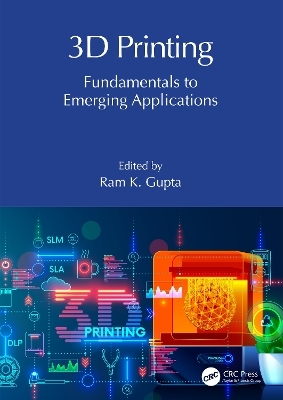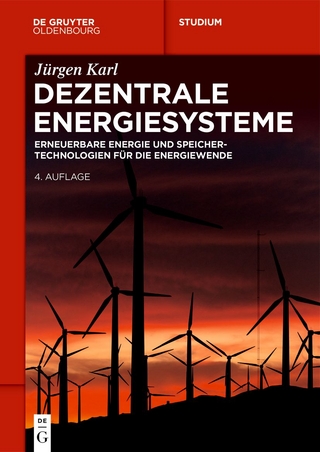
3D Printing
CRC Press (Verlag)
978-1-032-28401-9 (ISBN)
- Lieferbar (Termin unbekannt)
- Versandkostenfrei innerhalb Deutschlands
- Auch auf Rechnung
- Verfügbarkeit in der Filiale vor Ort prüfen
- Artikel merken
3D Printing: Fundamentals to Emerging Applications discusses the fundamentals of 3D-printing technologies and their emerging applications in many important sectors such as energy, biomedicals, and sensors. Top international authors in their fields cover the fundamentals of 3D-printing technologies for batteries, supercapacitors, fuel cells, sensors, and biomedical and other emerging applications. They also address current challenges and possible solutions in 3D-printing technologies for advanced applications.
Key features:
Addresses the state-of-the-art progress and challenges in 3D-printing technologies
Explores the use of various materials in 3D printing for advanced applications
Covers fundamentals of the electrochemical behavior of various materials for energy applications
Provides new direction and enables understanding of the chemistry, electrochemical properties, and technologies for 3D printing
This is a must-have resource for students as well as researchers and industry professionals working in energy, biomedicine, materials, and nanotechnology.
INTRODUCTION. 3D-printing: An introduction. Energy materials for 3D-printing. Nanoinks for 3D-printing. Functional nanomaterials for 3D-printing. Additives in 3D-printing. Architectural aspects of 3D-printing for improved properties. Methods of characterizations of 3D-printed objects. 3D PRINTING: MATERIALS AND APPLICATIONS FOR ENERGY CONVERSION. 3D printed carbon-based nanomaterials for solar cells. 3D printed graphene for solar cells. 3D printed metal oxides for solar cells. 3D printed MXenes for solar cells. 3D printed MOFs for solar cells. 3D printed nanocomposites for solar cells. 3D printed carbon-based nanomaterials for fuel cells. 3D printed graphene for fuel cells. 3D printed metal oxides for fuel cells. 3D printed MXenes for fuel cells. 3D printed MOFs for fuel cells. 3D printed nanocomposites for fuel cells. Materials and applications of 3D print for solid oxide fuel cells. 3D PRINTING: MATERIALS AND APPLICATIONS FOR ENERGY STORAGE. 3D printed carbon-based nanomaterials for batteries, 3D printed graphene for batteries. 3D printed metal oxides for batteries. 3D printed MXenes for batteries. 3D printed MOFs for batteries. 3D printed nanocomposites for batteries. Materials and applications of 3D print for solid-state batteries. 3D printed carbon-based nanomaterials for supercapacitors. 3D printed graphene for supercapacitors. 3D printed metal oxides for supercapacitors. 3D printed MXenes for supercapacitors. 3D printed MOFs for supercapacitors. 3D printed nanocomposites for supercapacitors. 3D PRINTING: MATERIALS FOR SENSORS. 3D printed carbon-based nanomaterials for sensors. 3D printed graphene for sensors. 3D printed metal oxides for sensors. 3D printed MXenes for sensors.3D printed MOFs for sensors. 3D printed nanocomposites for sensors. 3D PRINTING: MATERIALS AND APPLICATIONS IN BIOMEDICAL. 3D printed carbon-based nanomaterials for biomedical applications. 3D printed graphene for biomedical applications. 3D printed metal oxides for biomedical applications. 3D printed MXenes for biomedical applications. 3D printed nanocomposites for biomedical applications.OTHER EMERGING APPLICATIONS AND FUTURE CHALLENGES. 3D printed nanoinks for light-emitting diodes. 3D printing for thermoresponsive inks. Materials and design aspects of 3D printing for automobile industries. Materials and challenges of 3D printing for defense applications
| Erscheinungsdatum | 09.04.2024 |
|---|---|
| Zusatzinfo | 25 Tables, black and white; 50 Line drawings, color; 8 Line drawings, black and white; 120 Halftones, color; 8 Halftones, black and white; 170 Illustrations, color; 16 Illustrations, black and white |
| Verlagsort | London |
| Sprache | englisch |
| Maße | 178 x 254 mm |
| Themenwelt | Naturwissenschaften ► Chemie ► Technische Chemie |
| Technik ► Maschinenbau | |
| ISBN-10 | 1-032-28401-3 / 1032284013 |
| ISBN-13 | 978-1-032-28401-9 / 9781032284019 |
| Zustand | Neuware |
| Haben Sie eine Frage zum Produkt? |
aus dem Bereich


